”Wizardry Variants Daphne”
inheriting the spirit of the original “Wizardry”




In 1981, Sir Tech released the 3D dungeon title “Wizardry” on Apple II. The title is known to lay the foundation of computer RPGs, and has influenced many content creators throughout the world, not just limited to the game industry.
Film maker, director and writer, Mamoru OSHII, is also one of those creators that was heavily influenced by “Wizardry”. Mamoru is known for filming various Japanese animation works, but is also a hard core gamer that made many homage to “Wizardry” by inserting references of the game within his works such as in “Mobile Police PATLABOR”, “Mobile Police PATLABOR 2 the Movie” and “Avalon”.
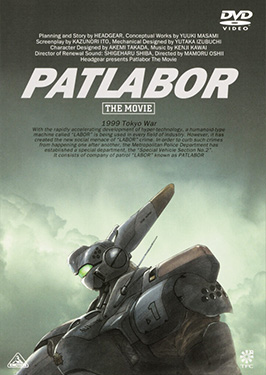
For over 20 years, Mamoru thought his passion over “Wizardry” was a one-sided affection, but actually it turns out it was a mutual love towards each other’s work. One of the original creators of “Wizardry” also known as the “Trebor the Mad Overlord” by fans, Robert Woodhead, is currently running the company, AnimEigo, founded in 1988 that brings Japanese anime and movies to the North American market. Robert has been a big fan of Japanese anime, and amongst many of Robert’s favorite anime includes titles directed by Mamoru such as “GHOST IN THE SHELL” and “Urusei Yatsura: Beautiful Dreamer”.
After 37 years since the release of “Wizardry” and 33 years after the premiere of “Mobile Police PATLABOR”, the two has finally met each other in late 2022.
What will the two legendary content creators talk about? Calm yourself before reading on as it will surely be an historical moment.
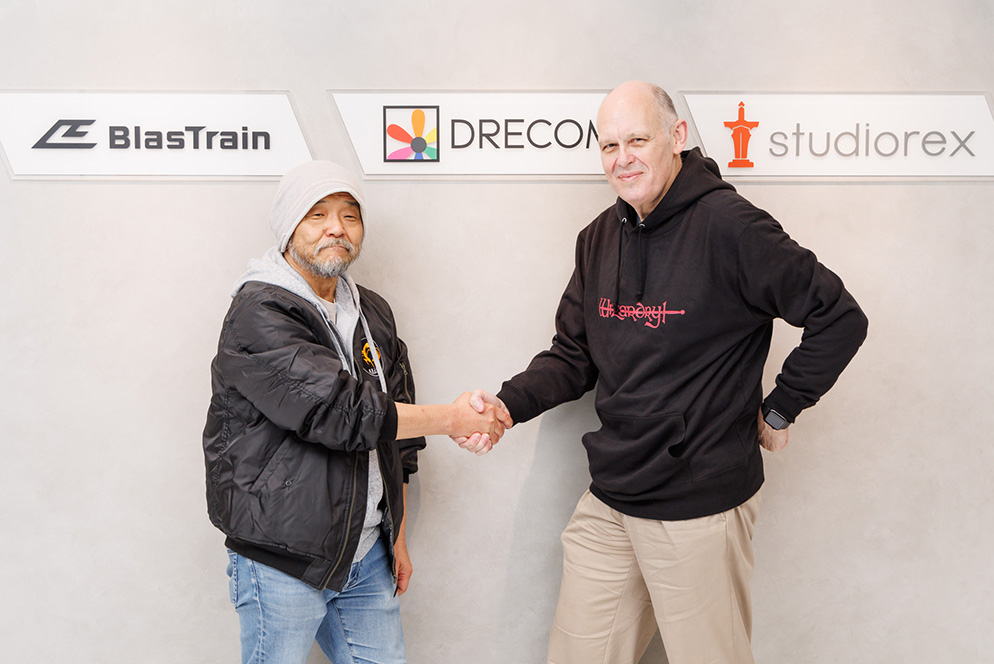

──Mamoru’s love of “Wizardry” is well known by his fans in Japan, but unfortunately there never was a chance for him to actually meet the creator of “Wizardry”. We are happy to hold this meeting to make that dream happen.
Mamoru OSHII (Mamoru):It’s nice to finally meet you.
Robert WOODHEAD (Robert):Hajime-Mashite (It’s is nice to meet you)
──As most seen in ”Avalon”, many of Mamoru’s works have included references and essences of “Wizardry” and is acknowledged by many how much he loves “Wizardry”. In “Mobile Police PATLABOR 2 the Movie”, the fighter pilots’ call signs such as “Wyvern”, “Wizard”, “Priest” and “Trebor” were an homage to “Wizardry” was it not?
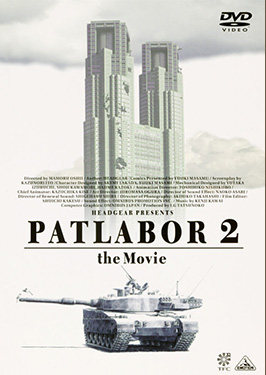
Mamoru:Yes, indeed they were.
──Robert, how did you feel knowing that your “Wizardry” has influenced Mamoru’s works? Oh, and by the way, Robert has mentioned that he also loves the TV anime series of “Urusei Yatsura” and the movie’s “Urusei Yatsura 2 Beautiful Dreamer”.
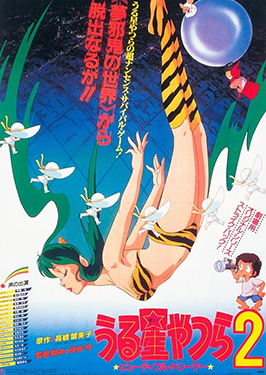
Mamoru:Wait, really?
Robert:Yes. Infact, my company did the English subtitles for Urusei Yatsura, including the TV series, the OVA and the movies. Most of the resources of the English version came from our company.
Mamoru:Wow, I was not aware of that. Thank you very much!
Robert:For the subtitles of Urusei Yatsura, I personally was involved in all of the series. Although the direct translation was handled by a different translator, I made sure that the English included all of the details and nuances of the original, while still sounding like a high quality English. I still can probably recite each line of characters from Urusei Yatsura. That series holds a very special part of my passion for anime.
Now, to answer the initial question, I was really happy to know that my works were included like an easter egg within your work, and I really felt your respect towards “Wizardry”. I too like making references and including easter eggs of names and lines that I like in my works too.
Mamoru:Yes, we creators can’t stop making references to things they like, and feel the need to include in their work. In “PATLABOR 2”, Wizard03 has lines of “I lost my position” and “request order” which are actually indirect references of “Wizardry”.
──Really? I did not know that.
Mamoru:It was not a subtle reference so was probably hard to recognize by many, but I wanted the character to speak a line that resembled the feeling of being lost in Wizardry’s dungeon. I actually included many other subtle “Wizardry” references but I think only 10% of them were discovered by fans.
In one of those 90% that is yet to be discovered, there is a doodle of a “Wizardry” dungeon map in one of the background art. I like placing easter eggs like those in my works, and also somewhat hoping that someone will discover it and realize where it comes from. Say if 100,000 watched the movie, maybe 100 of them would notice it. Placing around easter eggs is something most creators would say they like doing, including me. Like a fraction of the audience that watched “PATLABOR 2” probably knew about “Wizardry”, so it's a little extra content aimed for them. So in “Avalon” I made much more “Wizardry” references, maybe too much, ha ha ha.
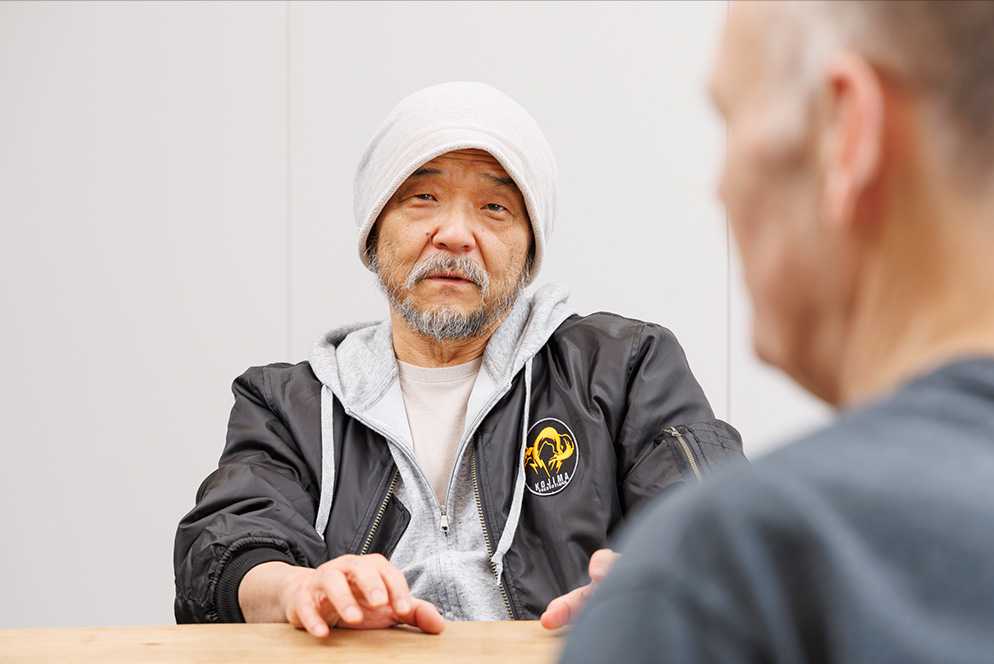
──One of the notable ones is that the name “Murphy” appears in “Avalon” does it not?
Mamoru:I always wanted to make a character called “Murphy” appear in my work. Part of the privilege of being a content creator means you have the chance to find ways to show respect for works you love by having it reappear in your work. I think every creator has that urge to do so. So, this may sound weird but I always wanted to meet you in person while I still can.
Robert:Thank you. I see we share a lot in common. I too like inserting easter eggs and references that maybe only a fraction of the users will notice. I inserted secrets all around my work too.
What’s interesting about this is that since I placed soo many of them, after like 10 years or so a fan would point it out and I would finally answer it as “Yes, after all these years you were the first to discover the reference”. Sometimes, a fan would make a connection with something I did not intend, but happened to sound reasonable just by coincidence. Despite not being intended, I would reply to them “Great discovery, somebody actually found it”.
Mamoru: Yes I too have that experience too. Maybe we are inserting those subconsciously. Even without you actively realizing, you might be making references to what has influenced you. Those influences are a significant driving force in creating a work, be it game or movies, and is also what makes it interesting to make a work aimed for the public.
On a wide spectrum, I see that creating something is a product of learning from others. When you create something, you start off by following something that exists. One might even say it is like re-interpreting existing works. Some may call it “stealing” while others may claim it's “inspired”, but I like to see it as it's a re-interpreting. A new movie is always a re-interpretation of another movie, and I think that goes the same with game designing too. When making references, there are always those pinnacle titles that many refer to too. It is like an entrance you need to pass in order to move on making new titles. For movies, those pinnacle titles would be like “Blade Runner” and “Alien”.
I see “Wizardry” as the entrance for game designing. One must always pass through that entrance before entering the world of creating RPG games, be it consciously or unconsciously. And it is very rare that you can create such pinnacle titles during your career. Even after making titles for years, only few with the perfect opportunities can make such works. For example, when making “GHOST IN THE SHELL” I did not make it with the intent that it will become one of those pinnacle titles that others may be influenced by. To be honest, at the time I made it with the intent to pay off my mortgage, ha ha ha.
──(laughter).
Mamoru:We did not have ample time as we only had like 10 months to film it. We did not have many options. But I was fortunate enough that when it was made, it was just the right opportunity. Those works that are made at the right moment of history are what people remember and influence them. I think “Wizardry” too is in a similar place that influences creators.
Being a rather modern media, it is difficult to say how long games and movies will take to be called a classical work, but I believe “Wizardry” is something that will be remembered in gaming for generations.
Robert:I strongly agree with you on that, and I think you worded it better than me. As like the saying from Pablo Picasso, “good artists copy, great artists steal” one would ‘steal’ as in to learn the techniques and inspiration and make it their own. One way to measure if a creator is successful might be to count how many other creators and works are inspired by you and redistribute your idea again into the world.
Imagine after 50 years from now, your work is carried over through generations and the essence of your work is seen within those future works is how I define a successful creator. What I wish for future creators is to compensate and fill any aspects that were lacking in your work, and remake your idea into something better and more influential for other future creators to inspire.
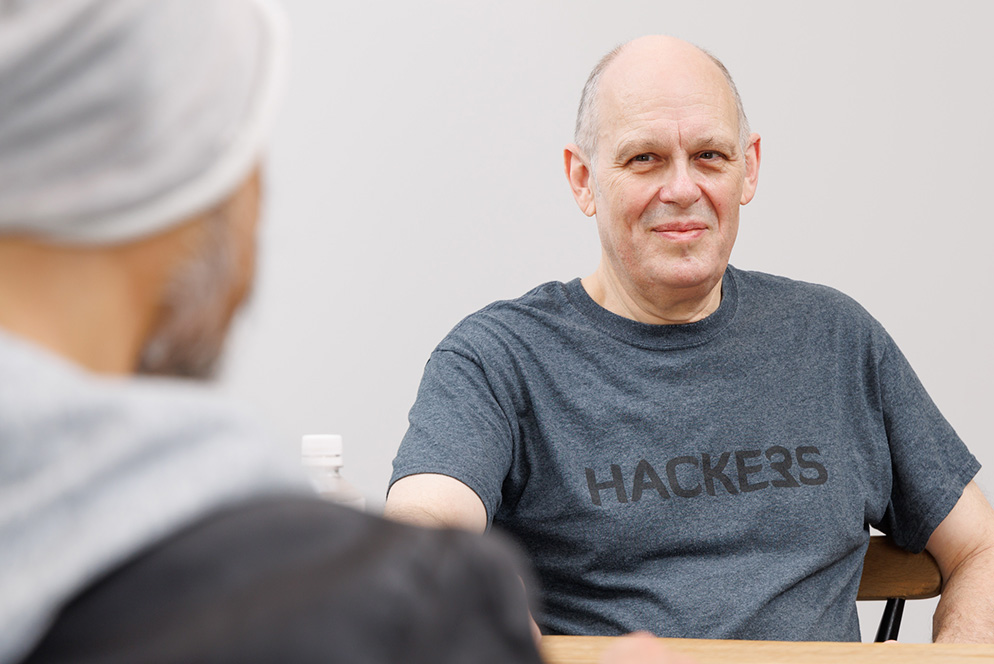
──Mamoru, “Wizardry” was an eye opener for you. How did you feel when you first played it?
Mamoru:It was around 40 years ago when I first played it, so when I was just past my thirties. It was also the time when I quit working for the studio and went freelance. At that time I did not have any job and had a lot of free time to spend. For around 3 years I was playing games everyday. Then one day, someone suggested to me that there was a great game called “Wizardry”. That someone was Kazunori ITO, my screen writer partner, who happened to have a copy of “Wizardry”. I learned it can be played on the Mac, so I went to buy myself a PC.
──Just to play “Wizardry”?
Mamoru:Yup. I dearly wanted to play “Wizardry”. By that time, I already played enough of Famicom, and wanted something more advanced like a PC game. But buying a PC at the time was not cheap, so I had to convince my wife that I needed a Mac for my job.
Robert:I hope you apologized to your wife afterwards. But yes, I too made a similar excuse to my wife that I will be using it for my job, but in fact was for my hobby. One of the purchases I made was a graphic board for Macintosh II. Originally I bought it to play games for myself, but later on that led to my current job so in the end I guess my words came true.
Mamoru:Back then, I bought the NEC PC-9801 (known as 98 series). I told my wife I needed a PC for my job, so I had to choose the 98. It did have basic word processing. At the time PCs were expensive, like costing half of a car. We even had to pay a mortgage even though it was not even real estate, ha ha ha.
Robert:Version 98 was the one that Shigeya SUZUKI at Foretune did the localization. I too was in Japan for the first time to handle a localization. The base localization made for English was later applied to other language localization such as French and German too. It even influenced other English localizations too.
Mamoru:Initially I was pretending to use 98 for my job and learned how to type. That typing skill was very useful to play “Wizardry” as spell casting and trap disarming required you to type out phrases. A simple typo resulted in many deaths when I played “Wizardry”.
Back then it was quite common to type out every in-game command unlike modern games where you just select a command. I had a hard time typing out “TILTOWAIT” and often misspell it at crucial moments and die, ha ha ha.
The “Wizardry” I played was the floppy version, so when the situation in the game went sour, I would place my hand on the reset button and be ready to eject the floppy from the disk drive.
──(laughter).
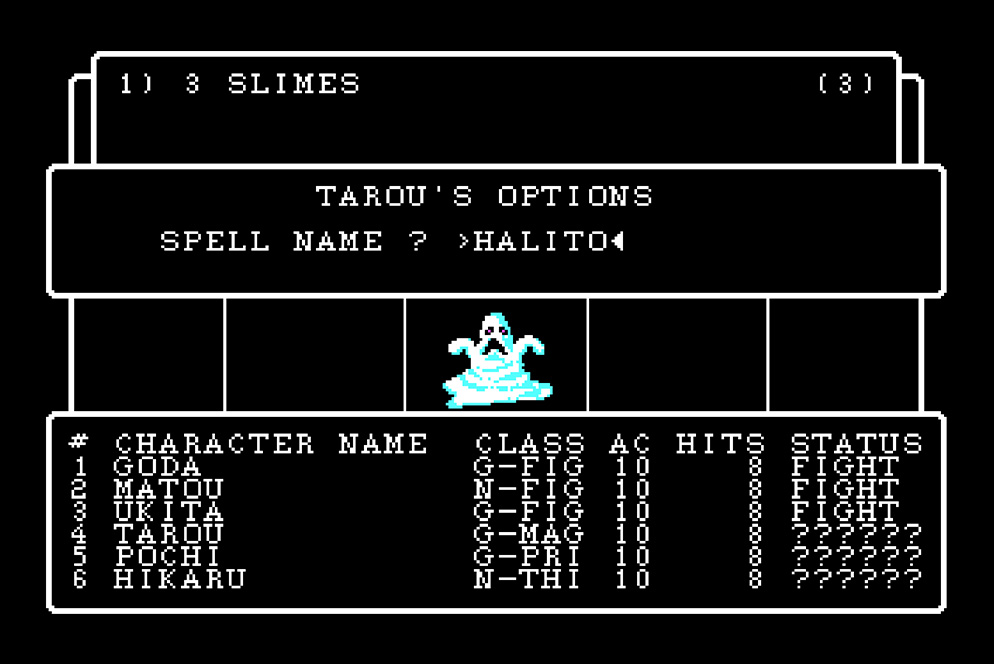
Mamoru:Unlike modern games, permadeath of a character was detrimental, with absolute no forgiveness. When you start out the game, you would witness many character deaths. I believe the process of making mistakes and being severely punished is what made players hooked on “Wizardry” as it forced you to learn and think ahead. Modern games hold your hand so it's easier to play, but at the same time takes away the opportunity to learn. So in “Wizardry” the players will be on alert full time, and trying to protect their assets even if it means using the unconventional reset and save scumming.
Robert:Moushi-Wake-Gozaimasen (I am deeply sorry)
Mamoru:Ha ha ha.
Robert:Looking back, I think unforgiveness of a game can be the charming point of a game. Although there are some parts I should not have done on “Wizardry” seeing it now, but back then we did not have many other references so we had to make it what we felt was right at the time. Looking at modern games, I don’t think they have lost their sense of unforgiveness, but just changed how it is implemented compared to say “Wizardry”.
For example “DARK SOULS” is a modern title series known for its unforgiving and difficult nature. But unlike how “Wizardry” would just wipe all your party from an unfair encounter, “DARK SOULS” has fine tuned adjustments on how the difficulty gradually scales as you progress and it is made to fit various playstyles that fit the player’s preference.
Mamoru: The way I see playing games is that although it is an entertainment, games should also be like real life. Certain mistakes should have unrecoverable consequences. People have been saying “Don’t get serious as it’s just a game”, but I disagree with that since I don’t see a point of playing a game that you can’t be serious and passionate about.
So that is how I came up with the concept of “Avalon” where the players of Avalon will be living off the earnings they make within the online game of Avalon. They are passionate enough to devote to playing the game by literally risking their life. To a point sacrificing their work. I bet some quit their jobs to play games.
I felt that something that people put passion into needs to be rewarded. You spent your life into it, so something should be earned from it. I did not have much money back then, so I wanted to find a way to earn something from it. I could not make a living off games, so I decided to make a living off of movies.
”Avalon” is loosely based on “Wizardry” and I made a movie out of it and even wrote a novel off of it (editorial note:”Avalon: Gray Lady, MF Bunko 2003),”ASSAULT GIRLS AVALON(f)” (Tokuma Shoten)). I put everything I had into those, also including the dungeons. I did it in anime and also in live action. So I think I have done enough with that.

Robert: I like to see that it was a good thing that there was not an environment where your passion spent in gaming did not earn your living, as if it did, I would have never seen my favorite anime made by you Mamoru.
If you were too into playing games and never decided to make a movie, that would have been a great loss. Your “Avalon” on the surface is a sci-fi action movie, which I love even just for that, but I think there is more to it underneath. If you look into “Avalon” more deeply, there are many philosophical messages, making you ponder more about the world. When I watched “GHOST IN THE SHELL”, I could not sleep for days when my mind was so perplexed with so many philosophical questions that the movie threw at me. The sensation of “What is this?” that I felt when I first watched the movie still remains vivid within me.
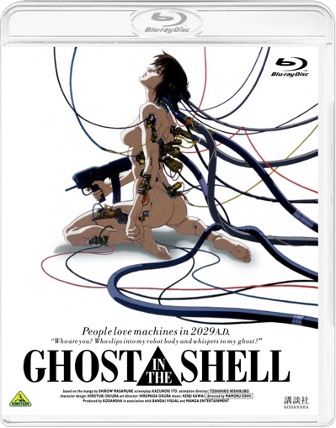
──Speaking of “GHOST IN THE SHELL”, which scene is your most favorite?
Robert:What caught me the most was the scene where the dumpster worker had all of his memories replaced with another memory. Subjectively, people are defined by their own memories to determine who they are. But how can you be certain if the memory you thought to have experienced and believed was true? Can you still call yourself human, or a product of fabricated deception? Despite being just one scene, it was very deep and yet was a very interesting philosophical message to me.
Mamoru:Back then I used to have many dreams about “Wizadry” in my sleep. When I was awake, I would be playing “Wizardry” all the time except when eating and taking a bath. So, I would be venturing in the dungeon even in my sleep.
Because “Wizardry” was using very simple visuals, it required players to use their imagination to picture the situation in-game. The game used wire-frame graphics, but I would imagine much more details in my mind. Take the tavern in the game for example. In the game, it does not show much about what is like in the tavern, so one would write a novel, or even make a film about it to detail out what they think the tavern of “Wizardry” is like. If the game has a full visual of the tavern, then players will stop using their imagination and just accept what they see.
Robert: In “Wizardry”, we used wire-frame graphics due to technological limitations at that time. Despite the original reason, it did have a positive side effect to it in that because of the simplistic graphics, players were able to immerse themselves better as they will have to actively be involved in the game by using their imagination.
Some may say that modern games may have taken away some opportunities for players to use their imagination to be actively involved in playing the game, but I feel that advancement of technology and how modern games depict more than what older games used to, is something we should all appreciate and praise. In some traditional animation, there are many creatives made by the creators like how they would put together camera angles and backgrounds that cannot be done in reality. Even a simple scene would have strategic adjustments made with the action speed to change the impression of a scene. I think these efforts made into creating a work is something we should applaud.
It is very difficult for a game to be immersive to everyone. Humans are ultimately a creature following its own desires, that most don’t have control over said desires. There lies some dangers in that. Depending how you make the game, the game can manipulate people's decisions. Trying to find the right balance is very hard.
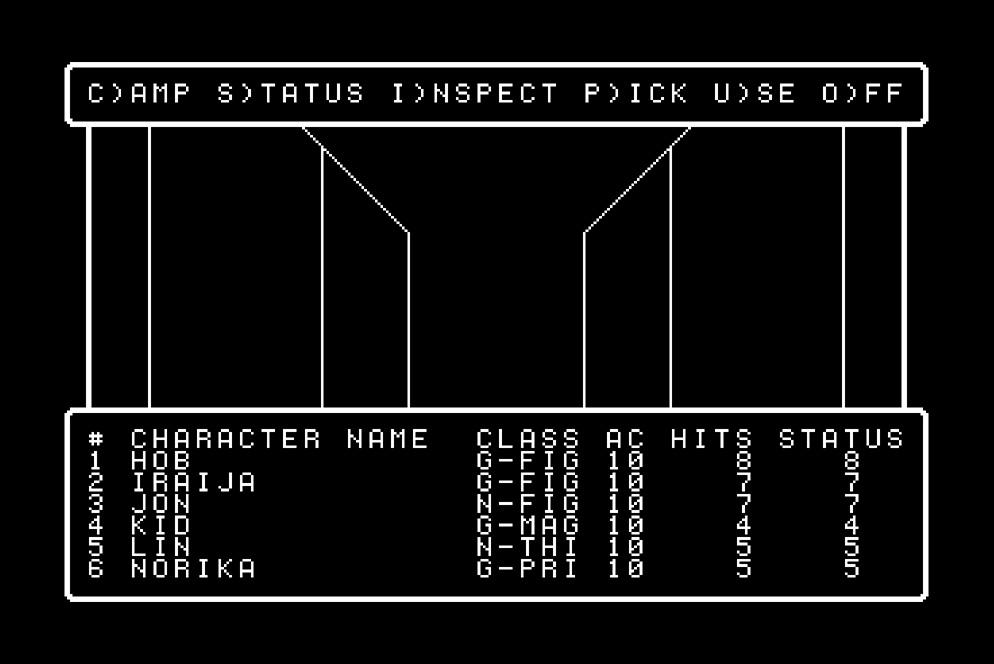

Mamoru:I think it is okay for people to indulge and become addicted to playing games. Not just games, but humans have a tendency to be addicted to something be it gambling like horse races. Humans feel happy when they are in the state of being addicted and we cannot stop that.
What is good about being addicted to games is that the player has much more input and control over it. In gambling like horse racing, you have little input and the outcome is mostly dependent out of your control. But when you play a game, you have to think of the tactic and strategy yourself, and you spend much more time on it. Because the time and effort it takes on your side, I think that is where the line is drawn between addiction to gaming and addiction to gambling. If you are rich enough, you can spend millions in a game, but that money is contributing to the economy, so I see that as a very productive thing in some way.
I also see that games require more intellectual involvement of the player. You have to actually think for yourself, which allows for an opportunity to make reasonable decisions of how far you should indulge yourself into the addiction. It requires creative talents to play a game. So I hope in the future there will be a game like “Avalon” where the players can make a living off of it by playing it.
Robert: That reminds me of an interesting episode we had when we made “Wizardry”. When releasing the overseas version of “Wizardry”, we had a meeting within our team on how we deal with pirated copies of the game. I, as a programmer back then, suggested that since we can implement a way to identify if the running game was using a real copy or not, if the game ran on a pirated copy of the game, it would make the PC dial up a toll call and pay us the money via that call.
We actually did not implement that system as that would overwhelm our server, and we would have gotten sued and maybe sent to prison! Regardless of making money off of players using a pirated copy and thinking back now, maybe we should have implemented a way that if a player used a pirated copy of “Wizardry”, the game will become much much harder than if you played it with a genuine copy, ha ha ha.
──Mamoru, besides “Wizardry” what other games have you played back then?
Mamoru: If we are speaking of RPGs, I played many others before “Wizardry” on Famicom such as “Dragon Quest”.
I played many other RPGs but they all pretty much had the same features. Strengthen your characters through level ups, buy equipment, and farm monsters to earn money, and opening chest for items. They all had the same concept with just different storyline. One grudge I had with the RPGs at the time was there was no option to become evil within the game. I am not too fond of the regular being the good guy and defeating the great evil to save the world type of situation that most Famicom games had.
I wanted to play more freely and do what I wanted. That is where “Wizardry” met my gaming needs. “Wizardry” allowed me to make more choices and I value a lot with being able to make my own decisions. This is a game, so I wanted to do something I could not do in real life. The game system of “Wizardry” was very flexible to allow players to make such choices.
──The main objective is to defeat Werdna, but you can completely ignore that if you wanted to in “Wizardry”
Mamoru:Exactly. I did not care too much about the overlaying story of the game, because I actually like my own head-canon story. I believe gaming is where one is able to express himself what he can’t in reality. Kids who play games subconsciously know this, but parents who do not understand this say “stop playing games and live your real life”. I think this discouragement is unfortunate as I believe the experience earned from games holds the same value as experience earned from reality. Both have equal value of emotional accomplishment and actualization if you ask me.
The only differences I see between them is that gaming allows more exaggerated expression, and that is also what captivates players to love playing games. When you are a kid, you are told you are only allowed to play a few hours a day. But when you grow up, you can make the decision to play as much as you want to your heart's content, of course as long as you are responsible for making that choice.
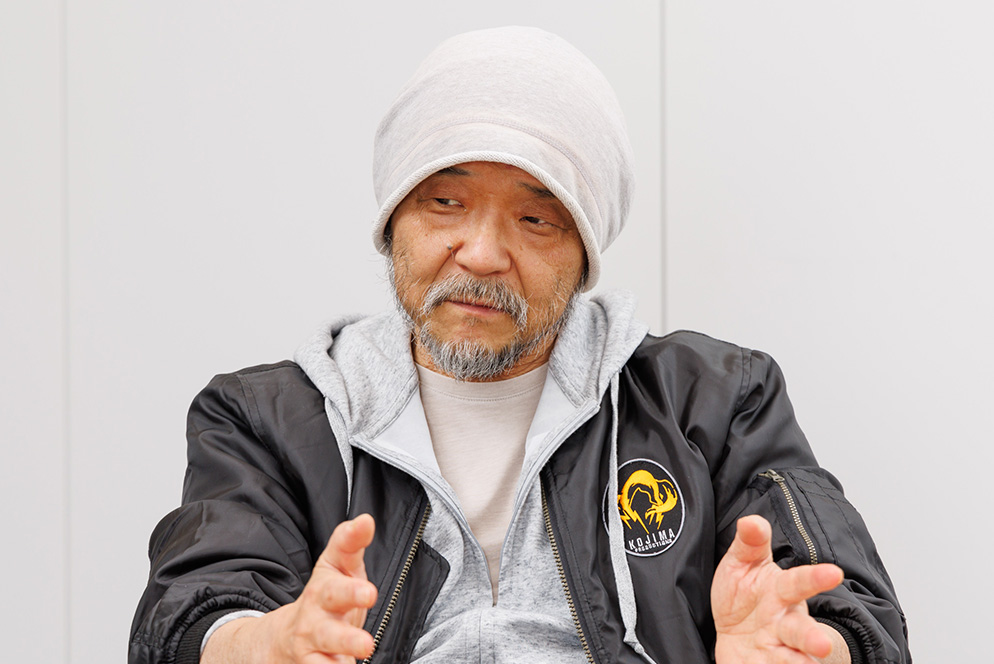
Robert:Many others claim that “Wizardry” is the origin of computer RPGs that allows an immersive experience and a medium to express oneself. But “Wizardry” is just a single link of a long chain of gaming history. “Wizardry” too has been inspired by other works such as “Dungeons & Dragons” and earlier computer games I played on the PLATO system which I was heavily influenced by because I very much liked it.
But I also see what you mean by being immersed into the game you love. I too have a couple of titles that I immerse myself in even after so many years since I first played it. The way I play the game is that I like to find unorthodox methods within a game, finding alternate ways to take on certain obstacles. If a game only allows one main solution and no other freedom to explore methods, I quickly lost interest in that game system.
Mamoru: Interesting way to see it. Speaking of immersion, I think there are many methods that a game can take to help players immerse into the game. Out of them, I think what is most important is the character avatar. It is crucial for immersion if a player can fit themselves into the avatar’s shoes or not.
Adventuring a wire-frame graphic in first person view had a downside of that it is hard to visualize who you are. You see the world, but you do not see yourself. I luckily was able to compensate for that lack of character avatar with my imagination, with fully customized characters made within my head. No other player can play this as this is my very own character named Inumaru. I use this character in other games too besides “Wizardry”, most of the games I played had a character named Inumaru in it.
──(laughter)
Mamoru: Every game I play, the character is called Inumaru, and I think that is the core of what a game should be. And I think “Wizardry” is one of the first that allowed you to do that character creation because it handed you a blank slate when creating one. The polar opposite would be “Ultima 4” where all the characters had set personalities, I would even call it an overkill of personalities. I played it once, but never did again as it didn’t fit my style.
The game forced you to be sort of a hypocrite to progress. I don’t consider myself to be a good person, and I did not intend to become one, so it just did not fit my taste. On the other hand, “Wizardry” allowed you to be evil if you wanted.
──You basically wanted your character to decapitate the enemy’s head with a critical right?
Mamoru: Who doesn’t? Although there are many ways to play it, I think the core of RPG is about dishing out violence and plundering the reward. It’s basically about unleashing your desires that you can’t do in real life. Movies too are the same, but they have stronger restrictions than gaming. It’s hard to film a truly evil main character going out mass murdering. So that is why we make zombie movies where the stuff we kill in the movies are “not human”. Film makers are always finding new ideas to film violence while thinking of a way to avoid moral criticism.
I think it is important that games provide a place where one can be evil without any repercussions of guilt. In “Wizardry” I killed Werdna numerous times with no remorse. And I think the same goes with movies too, in providing the audience with experiencing something forbidden without actually doing it and I think this is doing good for humanity.
Robert: I think I agree with what you are saying. Although I have no interest in killing something just for the sake of violence, I think it is important that games allow ways to execute that killing in creative or interesting ways outside the box. Like with how games insert sensitive humor in the game using clever ways. For example, in “Dragon Quest” there is a scene where an NPC does a “Puff Puff” on the player. When a kid reads it, they will take it literally as some innocent puffing going on. But when you read the line as an adult, you can understand the real meaning of the same line had much more mature meaning. I like it when the same method is used in family friendly movies where the same scene is totally different for children and adults.
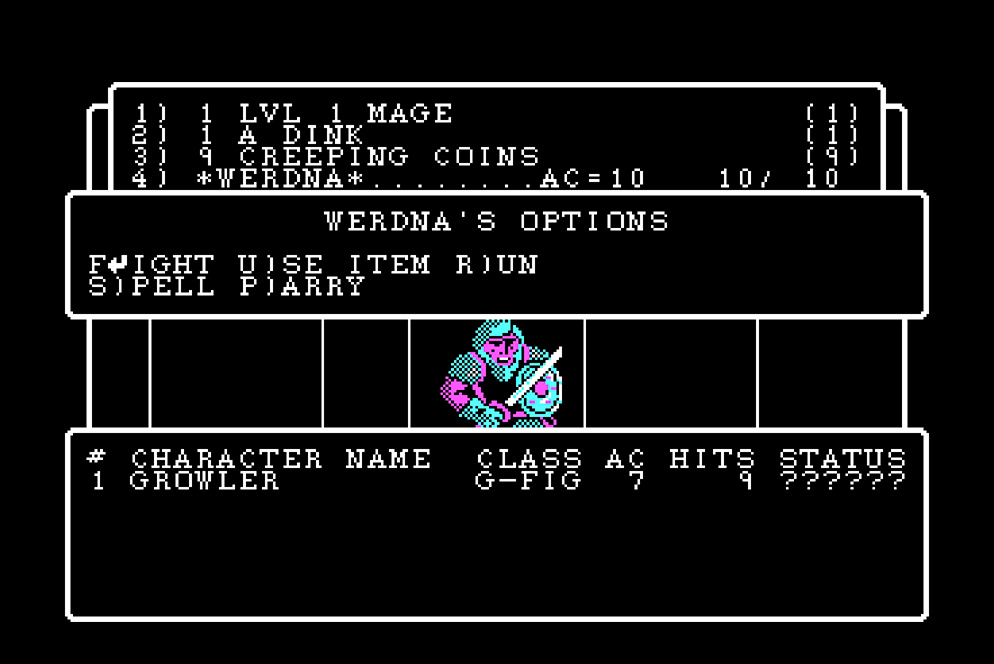
”Wizardry IV: The Return of Werdna” is the fourth in the series. Players take on the role of Wedna, the "evil sorcerer" who was the final boss of the first game, and clear the dungeon from the 10th floor underground. The game surprised fans with its composition, which is the complete opposite of the previous games, in which the player forms a party with the monsters that have appeared in the series and defeats the adventurers who stand in his way.
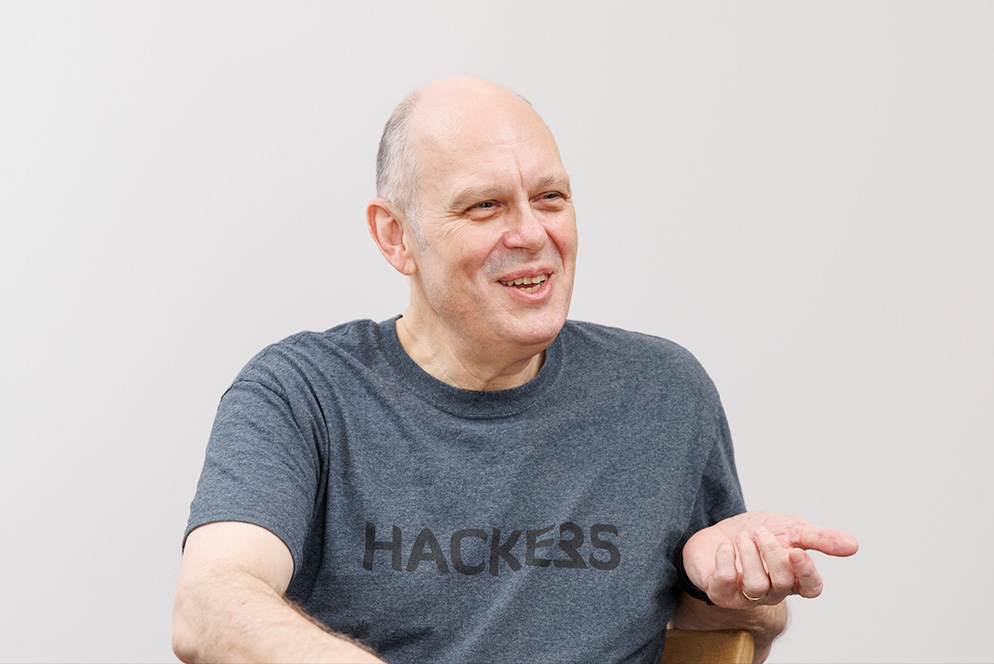
Mamoru:Games and movies need to have that kind of clever humor, or a leeway of expression one may say. It is not that important to fit everything within the box, as long as you mold the box to hold the capacity of what you try to fit in. One prime example I think are game mods in PC gaming where players become creators to customize their gaming experience to fit your own story in the game you love. Modded games allow you to replay the same game with a totally different experience. I value game mods but unfortunately in Japan, game modding culture is still shallow. One thing I want to request from game designers in Japan is to allow a more mod friendly game. I think there are a lot of wasted opportunities with Japanese games since it does not have much mod support. Robert, what do you think about game mods?
Robert:When I play a game, I run several mods and most of them are quality of life mods that help with the playability of the existing feature. I think the culture of game modding should be praised a little more not just by players, but also by creators too. Game mod greatly enhances the gaming experience that the game was designed for, and I think game modding should have more credit over that. Also I like the concept of being able to create your own mod. I even made a mod for a game too, you know. Although I understand it requires some technical knowledge on how to make a mod, I think it should become more common.
Mamoru:To encourage game modding, I think it is all right with paid game mods. If a mod can generate revenue to those who made it, it will create competition, thus raising the quality of the mod. I don’t even mind if a mod becomes more expensive than the base game itself as long as it is made to meet the price. If game modders can make a living off making mods, I will support that idea. From my personal experience, something you made with passion should be rewarded, or else it is hard to fully dedicate yourself to creating something good.
During my 71 years of experience of living, money is what makes people work seriously. Movies too are similar. When you can watch any movies for free, you lack motivation as you don’t feel the involvement with money. When you actually pay money to see a movie, it is a different experience since you actively committed yourself to that movie. I think theaters should have more options for people to spend money or to offer a way to contribute to something they like. Once you enter the theater, there is not much way to support the creators but to buy some pamphlets or some merch items.
By offering more ways to contribute to the creators, I think creators don’t have to rely on heavy whaling minorities to support the funding. So that is why I advocate game creators should allow more mods in games. Maybe even the creators themselves can make mods of their own game. Companies are already selling DLCs anyway.
Switching the subject a bit, a MMORPG is also a medium for communication. In a way, it is a chat system with a supplementary feature to be able to play a game. So maybe there can be a game where you can only communicate within a tavern, and you need to spend money at the tavern like when you go out drinking in real life. Games should provide more options to spend money. I’m not talking about having a gambling like system like gacha, but more proper ways to spend money for a justified gain. I think games have potential to expand on that concept of handling money for the experience they provide.
──Lastly I want to ask both of you your thoughts on the upcoming “Wizardry” title by Drecom, “Wizardry Variants Daphne”. The main theme of the title is to create “your own adventure”, and to explore the world in the traditional RPG style. As it was brought up earlier, this title re-interprets the older titles into bringing it to modern gaming. Mamoru, what do you expect from this new “Wizardry”?

Mamoru:Me? That is easy. I expect to have many options for me to spend money on it, ha ha ha.
I understand that making a game in this era is a tough thing to do. Every ten years, I am lucky if I can find a title that I can be fully addicted to. Everyone is looking for that game, but unable to meet one. There are so many demands, but the needs are not met. Some Japanese titles with monetization unfortunately are aimed at spending money becoming the core experience of the game, and the game is just an accessory to that. What I want is a game where I can fully be immersed in and spend money for that game.
Movies have some similarity, but the difference is that games require players to be devoted to it much longer. When you watch a movie, you might think over it for a while, but eventually you will forget about it in like 3 days. On the other hand, playing a game means you are living an alternate life during that gameplay. The level of immersion in a game is much deeper than watching a movie. We all are waiting for that game to appear. I am waiting for that game. We all yearn to live in an alternate reality because that is how we are made. Living the reality can be tough, so I really expect a lot from this new title. And if it requires me to pay money to experience that, I am ready to pay money into that.
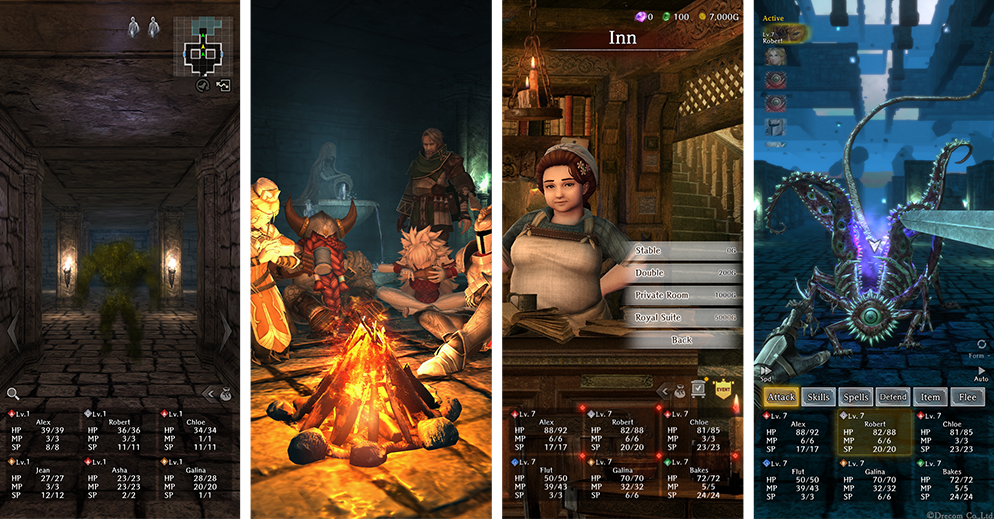
──How about you, Robert?
Robert: What I am hoping to see are the reactions of the users when they play “Wizardry Variants Daphne”. I have test played the developer’s version and although some parts I could not read as it was in Japanese, I really felt that the title had the feeling of the original “Wizardry”, bright back in modern gaming. It felt very “Wizardry” to me. To some degree, it feels rather inappropriate for me to express what I expect out of “Wizardry Variants Daphne” because I don’t want my opinion to influence what is being made now.
Out of the entire “Wizardry” series, I was only involved in the first couple of them. The later sequels were made by a different development team. I don’t want to force my style onto them by openly voicing out what I think is right. All I hope for is that it is made by what the developers feel is right, and if they can surprise me with making something that surpasses my expectation, that will be great. What is most important is not what I think it should be, but what the developers think is good and can be satisfied with what they made.
──I thank you both for this special meeting.



